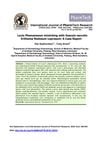 December 2023 in “International journal of multidisciplinary research and analysis”
December 2023 in “International journal of multidisciplinary research and analysis” SH-MSCs gel can effectively treat alopecia by increasing IL-10 and decreasing TNF-α gene expression.
 December 2023 in “Frontiers in microbiology”
December 2023 in “Frontiers in microbiology” Mannan oligosaccharides improve raccoon dogs' fur quality and overall health.
 December 2023 in “EPRA international journal of multidisciplinary research”
December 2023 in “EPRA international journal of multidisciplinary research” Alopecia areata causes sudden hair loss, has genetic links, and can be managed but not cured.
 December 2023 in “Intisari Sains Medis”
December 2023 in “Intisari Sains Medis” SLE and DM can coexist but are rare and need careful evaluation.
 November 2023 in “International journal of biology, pharmacy and allied sciences”
November 2023 in “International journal of biology, pharmacy and allied sciences” Herbal treatments can help with hair problems, but more research is needed.
 November 2023 in “Linköping University medical dissertations”
November 2023 in “Linköping University medical dissertations” Keratinocytes and adipose-derived stem cells can effectively heal difficult skin wounds.
 October 2023 in “JOJ dermatology & cosmetics”
October 2023 in “JOJ dermatology & cosmetics” Thiocyanate helps hair growth and can be supplemented in diet or applied topically.
 August 2023 in “JOJ dermatology & cosmetics”
August 2023 in “JOJ dermatology & cosmetics” Antibiotics often cause skin reactions, making them a major health concern.
 July 2023 in “The Egyptian Journal of Hospital Medicine ”
July 2023 in “The Egyptian Journal of Hospital Medicine ” Alopecia areata is a hair loss condition caused by immune factors and can be treated with JAK inhibitors.

Many patients with cutaneous lupus erythematosus experience hair loss and nail problems, which are important for diagnosis and treatment.
 November 2022 in “CARDIOMETRY”
November 2022 in “CARDIOMETRY” A group has developed therapies that show promise for treating cancer and various other conditions.
 November 2022 in “Journal of Education, Health and Sport”
November 2022 in “Journal of Education, Health and Sport” The skin's bacteria might influence the development of a hair loss condition called alopecia areata.
 September 2022 in “Dermatology and therapy”
September 2022 in “Dermatology and therapy” Contact immunotherapy might help treat various skin conditions, but more research is needed to confirm its safety and effectiveness.
 July 2022 in “medRxiv (Cold Spring Harbor Laboratory)”
July 2022 in “medRxiv (Cold Spring Harbor Laboratory)” Satoyoshi syndrome is likely an autoimmune disease that mainly affects young women and improves with immune-related treatments.

The document concludes that the development of certain tumors is influenced by genetic background and that a specific gene modification can lead to tumor regression and reduced growth.
 January 2022 in “International journal of zoology and animal biology”
January 2022 in “International journal of zoology and animal biology” Dogs with dermatomyositis, especially Collies and Shetland Sheepdogs, need better treatments for their skin and muscle inflammation.

Human hair keratins can be turned into useful 3D biomedical scaffolds through a freeze-thaw process.
 April 2021 in “BMJ Case Reports”
April 2021 in “BMJ Case Reports” Accurate diagnosis of pseudolymphomatous folliculitis is crucial to avoid mistaking it for more serious conditions.
 March 2021 in “Actas Dermo-Sifiliográficas”
March 2021 in “Actas Dermo-Sifiliográficas” The microbiome may be linked to hair loss and could be a target for new treatments.
 March 2021 in “Mansoura Veterinary Medical Journal /Mansoura Veterinary Medical Journal”
March 2021 in “Mansoura Veterinary Medical Journal /Mansoura Veterinary Medical Journal” Ringworm is a common, contagious fungal infection in dogs that can spread to humans and requires lengthy treatment.
 January 2021 in “Advances in health sciences research/Advances in Health Sciences Research”
January 2021 in “Advances in health sciences research/Advances in Health Sciences Research” Two siblings with gray patch tinea capitis were successfully treated after identifying risk factors.

Human hair keratins can self-assemble and support cell growth, useful for biomedical applications.
 January 2020 in “Der Pharmacia Lettre”
January 2020 in “Der Pharmacia Lettre” Nanoparticle-based herbal remedies could be promising for treating hair loss with fewer side effects and lower cost, but more research is needed.

PlacMA hydrogels from human placenta are versatile and useful for cell culture and tissue engineering.
 January 2020 in “International Journal of PharmTech Research”
January 2020 in “International Journal of PharmTech Research” A man with severe leprosy developed painless ulcers and numbness, treated successfully with multiple drugs and vitamins.
 November 2019 in “Harper's Textbook of Pediatric Dermatology”
November 2019 in “Harper's Textbook of Pediatric Dermatology” The document is a detailed medical reference on skin and genetic disorders.

The document is a detailed guide on skin conditions and treatments for dermatologists.
 May 2019 in “Asian Journal of Pharmaceutical and Clinical Research”
May 2019 in “Asian Journal of Pharmaceutical and Clinical Research” Eclipta prostrata, particularly its chloroform fraction, effectively reduces inflammation and arthritis.
 January 2019 in “Springer eBooks”
January 2019 in “Springer eBooks” Transplanting skin cells is a safe, effective, and affordable treatment for vitiligo.

Botulinum toxin type A significantly reduces scalp psoriasis severity compared to placebo.





























